

  |
|
|
||||||||||||||||||||||
|
FMS FEATURE... March 8, 2010 Bruce Broughton at 65 Award-winning Hollywood composer held in high esteem by peers by Jon Burlingame 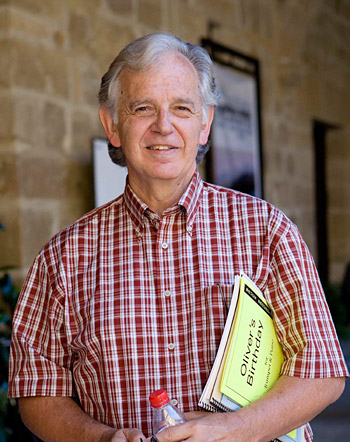 But don't speak about retirement to the Oscar- and Grammy-nominated, multi-Emmy-winning composer. He seems to be busier than ever, with projects in multiple arenas of music-making – from concert-hall commissions to high-profile animation projects to theme-park rides – and he remains a leader in the Hollywood music community, currently serving both as a governor in the Academy of Motion Picture Arts & Sciences and on the board of directors of ASCAP. "Few film composers have raised the standard of our industry by being overqualified for the work," says fellow Emmy-winning composer Richard Bellis. "Bruce is, most assuredly, a member of that exclusive club which include the likes of Korngold, Rozsa, Goldsmith and Williams." 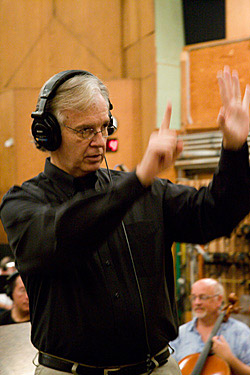 Writer Michael Schelle (The Score) cites Broughton's Grammy-nominated music for Young Sherlock Holmes (1985) and soaring signature for The Boy Who Could Fly (1986) as "arresting, highly original and technically stunning orchestral scores" and The Presidio (1988), Tombstone (1993) and The Shadow Conspiracy (1997) as examples of his "dramatic, aggressive and sometimes unnerving" contributions to contemporary film music. No other composer currently working has as thorough a grasp of the Americana idiom – "a simple, American folk-musical honesty," says CinemaScore editor and longtime film-music chronicler Randall Larson. Several of Broughton's Emmy nominations and wins have recognized his facility in this arena, from the Civil War miniseries The Blue and the Gray (1982) to the Willa Cather saga O Pioneers! (1992). Among his feature credits, the country guitar and fiddle of Square Dance (1987) and the cross-country animal adventure Homeward Bound: The Incredible Journey (1993) are, as Thomas puts it, "quintessential Americana, a style in which Broughton is at ease." 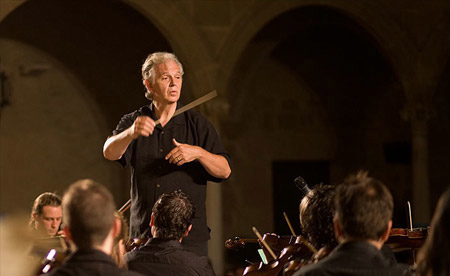 (Photo copyright 2008 Julio Rodriguez) Animation buffs have been keen on Broughton scores for more than two decades. This writer was present for the 1990 recording of "Cody's Flight" in The Rescuers Down Under and can attest to the excitement among the producers and director when Broughton's thrilling music breathed life into their hand-drawn images. The Steven Spielberg-produced Tiny Toon Adventures, the 1990s Roger Rabbit cartoons and the more recent Disney videos The Three Musketeers (2004) and Bambi II (2006) have all benefited from the Broughton touch. "He enhanced Bambi II with such bucolic lyricism and innocence," says Larson. Michael Giacchino, who just won an Oscar for an animation score (Up) received an Emmy (for Lost) on the same evening that Broughton won his record 10th Emmy (for HBO's FDR film Warm Springs) in 2005. Giacchino recalls: "Winning the Emmy was a thrill for me, but knowing that I had just won it alongside one of my true heroes in film music was almost too much for me. Bruce's music embodies what great film scores are all about – tradition, melody, harmony and most importantly emotion and storytelling. His commitment to the art of film scoring and the film-scoring community is always an inspiration." 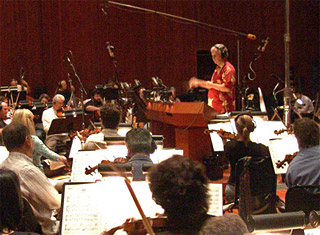 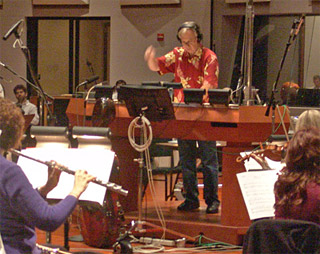 Even when there is no film or TV assignment before him, Broughton never stops scribbling notes. Jerrold Immel, composer of TV's Dallas and Knots Landing, who worked with Broughton during their days at CBS in the 1960s, remembers listening to one of Broughton's early concert works and hearing the composer express his hope that his music might be considered elegant. "And it was," says Immel. "That's stayed with me through the years. The word 'elegant' reflects both his writing and his life." Broughton's concert-music catalog has grown immeasurably in the past decade, including concertos for tuba and piccolo, multiple chamber works (ranging from flute and piano to harps and percussion) and numerous pieces for band. "Not only has he given us wonderful music," adds fellow Oscar nominee Patrick Doyle, "but he has given so much of his precious gifts and time to assist others throughout his career. He is an example to all of us in how to stay honest and true to oneself and giving generously at all times in his advice and experience. He is also great company! His modesty and altruism are an inspiration to all of us." No film composer since Elmer Bernstein has held such a prominent leadership role in the film-music community for so long. Broughton served as president of the Society of Composers & Lyricists throughout the 1980s and into the 1990s. He served several years as a governor of the Academy of Television Arts & Sciences and currently serves as a governor of the music branch of the Academy of Motion Picture Arts & Sciences. He is also a member of the board of directors of ASCAP and is, this semester, teaching in the Scoring for Motion Pictures and Television program at USC. In each case, he was helping to keep film and TV composers and songwriters together as a community, to help shepherd a new generation of musicians into the business, and to help protect their rights as creative artists in a modern medium. Notes ASCAP president and board chairman Paul Williams: "He's a powerful voice for film composers. For those of us who see him in action around the board room, one thing is clear: His passion for the work and commitment to his fellow composers is as moving as his music." For a final thought about Bruce Broughton, we turned to a fellow Oscar nominee, multiple Emmy winner and equally respected composer, Laurence Rosenthal, who recalled "hanging out one afternoon" in the office of MGM music-department chief Harry Lojewski: "I just happened to notice an open score on his piano and was, with characteristic obsessiveness, drawn to check it out. "The first thing that caught my eye was the elegance and precision of the musical calligraphy and very quickly thereafter the clearly beautiful sounds those black dots were representing. Of course, I immediately blurted out, 'My God, Harry, who's this?' So that was my first introduction to the music of Bruce Broughton, still a young tyro at the time. "The ensuing years not only fostered a warm friendship with this exemplary human being, but an ever-increasing appreciation and respect for the work of one of the most genuinely gifted composers writing for the movies. In addition, he has often turned to concert music and to conducting, in both of which he excels. One can only be grateful for that kind of true musicianship, by no means ubiquitous in the film world. "And if all that were not enough, he has given so much energy to activities involving the community of composers in the film capital that one can only marvel at the extraordinary versatility of his capacities. As an old friend, and as an enthusiastic admirer, I take great pleasure in saluting him on his 65th." 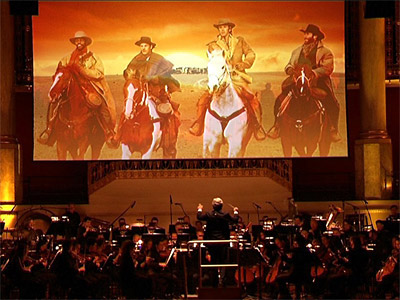 ©2010 Jon Burlingame |
Search
Past Features
|